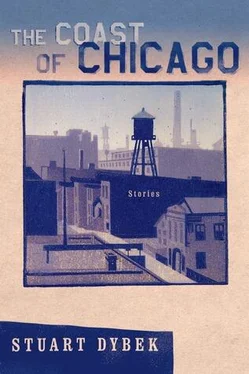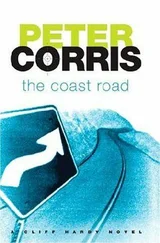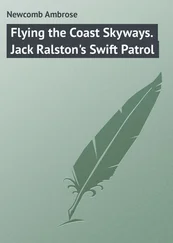A kiss crosses the city. It travels along streets named for coasts — North Shore, Lakeside, Waveland, Surf — that echo as if paved with wet tile. Above the streetlights, nighthawks wheel, yiping like gulls. Beneath windowsills, the shadowy mark of the last tide fades like an impression of elastic on a bare waist.
A kiss crosses the city, floating facedown like a reflection over the dreamers gazing up from a neighborhood of flooded basements and attics. Behind grated shop windows, the mannequins are mermaids; each night they reenter the sea as if drawing a zipper down the spine of a blue-green gown.
Her kiss crosses the city along a bridge arched like the bluest note of a saxophone, an unfinished bridge extending out over a night sea of sweet water. The beacon revolving at its end may be the dome of a squad car or the lantern of a fisherman. Trailing less shadow than a fish, her kiss slips undetected past lamps, past the flashlights of night watchmen, past gates, alarms, curfews. Not even the lips it’s meant for feel the secret entry of her tongue, the scrape of her teeth, or, when she pulls away, the clinging thread of briny spit.
In the rain, the alley becomes a river that winds through sleepers. Lovers listen to it flow through the dark — or so a man unable to sleep imagines. He can almost hear the river too, although he knows that listening for it may merely be a way of occupying his mind, which should be dreaming. There may be no lovers at all. Even if there are, they may be asleep with mouths opened and backs turned to each other.
It wouldn’t be the first time he’s measured his life by imagining lovers. He remembers, on a morning when he was younger, standing at the window of the copy room in the highrise office building in which he worked, and gazing across the busy avenue at the shade-drawn windows of an old hotel that still retained its elegance. Even now, he recalls the surprising rush of emotions when it occurred to him as if he could sense it that, while he stood listening to the clatter of Xerox machines, lovers were waking just across the street. Perhaps he’d only imagined the lovers then as well, but at that moment their presence behind the shade-drawn windows seemed so palpable that his own life felt insubstantial beside it, and he was filled with an ache for something he couldn’t name but knew was missing. If they were only a daydream, then it was the kind of daydream that sometimes precedes a revelation. That was the morning he’d become certain that he wasn’t right for an office job and needed to change the direction of his life while there was still time. A week later, he had quit and returned to school.
Tonight, he senses their presence again. He’d rather feel the presence of lovers, imaginary though they may be than the absence of the woman he’s separated from. If only for a night, they’re a respite from the conversation he carries on without her, addressing her as if she can hear him. The lovers are silent. They lie listening to the river, and with his eyes closed he can almost hear it as they must: a high-pitched echo of sewers, a sound of darkness laced with flowing water. Every crack trickles, every overhang drips. Each drop encases its own separate note, the way each drop engulfs its own blue pearl of light.
Between wakefulness and dreaming, with his eyes closed he can see the light reflected by the falling river of rain: fogged streetlamps and taillights streaked along the Outer Drive, a downtown of dimmed office buildings and glowing hotel lobbies, acetylene sparking behind blue factory windows, racks of vigil candles in the cathedral, always kept open, across the street from the neon-lit bus terminal. If he were to rise and walk along the river, he’d see the shades raised and curtains parted, and find himself in a neighborhood where the dark buildings, as he’s always suspected, are populated by lovers. Their silhouettes stand undressing, framed in windows, naked and enigmatic like the lovers on a tarot card — men and women, men and men, women and women, embracing. Lovers in the present appear superimposed over lovers from the past so that it’s impossible for him to tell who is a shadow of whom. The rooms, parked cars, all the sites of their private histories, glimmer as if their memories have become luminous as spirits. Even the loners are visible beneath single bulbs, appraising their desire in mirrors. The El clatters by above the roofs, its lighted windows like a strip of blue movie.
Nearly asleep, the man listens to the clatter of the El train, fading over viaducts, merging, as it grows distant, with the sounds of sporadic traffic and occasional sirens, all swept along together in the rush of the river. Listening to the river is another way of thinking about the woman. He’s drifting on a flood of night thoughts — thoughts he may try to dismiss in daylight, the way dreams are renounced and forgotten, but his restless nights have begun to inform his days. Almost dreaming, with the river flowing beside his ear, he understands why the lovers have been summoned: because the memory of the woman is becoming a shadow, one he carries like a secret, close to his heart; because beside this memory he has grown insubstantial. It draws him along behind it like a shadow — a shadow of a shadow. It has made him dark and incomprehensible even to himself. The lovers from the present have appeared, as they did when he was younger, to remind him that there is only so much time to change the direction of a life. The lovers from the past have appeared because it may already be too late, because it may be time to release his memories so that they can begin to assume a life of their own.
And what about the memory of the boy left at the window, staring out past his own spattered reflection? The boy could disappear behind a single breath fogged on the glass, then wiped away. The room has fallen asleep behind him; the bed, without his weight, is light enough to levitate. Downstairs, the Ukrainian kid, a maestro now, has begun to fiddle a nocturne to pacify the dead. Across the alley, prayers rise like an attar of roses from a basement flat. Love, rain has replaced nighthawks. It drums on the helmet of a blue light. Each drop contains its own blue bulb, and when they shatter they collect into a blue river that continues to gleam. The river, the same river sweeping them both away, is all that connects the boy and the man. It flows through the inland city, down streets it submerges, to the slick highways that bank a black sea of prairie. It empties by the piers where the rusty barges are moored along the ghostly coastline. From his window overlooking the alley that has become a river, the boy can see this. He can see the blue of that single bulb diffused in the sheen of breakwaters and distant winks of pumping stations, in the vague outlines of freighters far out on what, come morning, will be a horizon. He could glimpse the future passing, reflected in the current, if he weren’t watching the streetlight slowly sinking as it swirls into the vortex of a sewer, if he weren’t still waiting for the silhouettes to come for him. He doesn’t realize — he won’t ever know — that, like them, he’s become a shadow.
The moon, still cooling off from last night, back in the sky — a bulb insects can’t circle. Instead, they teem around a corner streetlight, while down the block air conditioners crank, synchronized with katydids.
There’s a light on in a garage where a man’s legs, looking lonely, stick out from under a Dodge. What is it that’s almost tender about someone tinkering with a car after midnight? The askew glare of the extension lamp propped in the open engine reminds me of how once, driving through the dark in Iowa, I saw a man and woman outlined in light, kissing in a wheat field. They stood pressed against each other before the blazing bank of headlamps from a giant combine. It must have been threshing in the dark, for dust and chaff hung smoldering in the beams, making it seem as if the couple stood in smoke or fog.
Читать дальше












